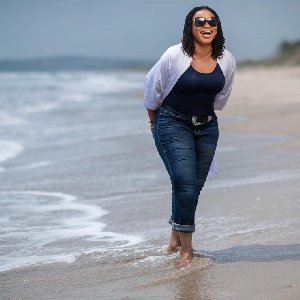
[ad_1]
 Former President of the Electoral Commission, Charlotte Osei
Former President of the Electoral Commission, Charlotte Osei
Former electoral commission chairman Charlotte Kesson-Smith Osei said she did not vote in last year’s election.
She said she was at the beach on December 7, 2020 which was voting day as well as the 8th and 9th.
When asked why she didn’t watch and vote during the polls, she replied, “Why should I do this?
“I was at the beach [on the 7th, 8th, and 9th of December 2020], I did not vote, I did not monitor the elections, why should I? She said on Joy News on Wednesday August 18.
When the host said he was monitoring the elections because he was paid by his media house to do it as part of his job, Ms. Osei retorted: “I was not paid to monitor the elections. . So I can’t have time with my kids at the beach?
Regarding the electoral reforms undertaken by this current electoral commission, she said any changes or policies aimed at expanding the space for inclusion should be accepted by all Ghanaians.
She added that policies that seek to make people feel concerned with Ghanaian institutions should also be adopted.
She said this during a speech on Joy News Wednesday (Aug. 18) on some of the electoral reform proposals put forward by the current leadership of the election management body.
“My point of view is that any policy or reform that expands the space that creates new pathways for inclusion that creates pathways for transparency should be adopted. My view is that anything that makes us as citizens feel in the sense of ownership of our own institutions and creates accountability on the part of appointed or elected state officials should be encouraged. “
The EC has made a number of reform proposals for the elections in Ghana.
These include, “We are proposing to close the polling stations at 3 pm rather than 5 pm. In 2019, we announced our decision to close polling stations at 3 p.m. instead of 5 p.m. in the 2020 election.
“Nevertheless, due to the COVID-19 pandemic and the strict and necessarily long security protocols that we have put in place in our polling stations, we have been forced to suspend this proposal. Over the past few months, however, this proposal has resurfaced in various sections of the public, and indeed our own experience with the 2020 election has revealed that it is a workable proposal, because at 1 p.m. most of the polling stations were empty, suggesting this is a workable proposition. It is therefore a reform that we intend to propose.
“Again, we propose to abolish the system of periodic registration exercises nationwide and institute a comprehensive system where citizens who are 18 years old, or those who have not already registered, can go to any district office with their Ghanaian card or passport and register as voters.
“This will help us eliminate nationwide registration exercises and go a long way in reducing the cost of elections.
We also offer a year-round exhibition system that will allow citizens to check their registration details on their smartphones and other mobile devices.
Citizens would not need to wait for an exposure exercise to verify their contact details. They will be able to do this all year round.
We propose to make our collation process more efficient by focusing on data entry only at the constituency collation center. The entry point for entering data into the system will be the constituency collection center.
The data, i.e. the results of the constituency collation, will be made available to all stakeholders at regional and national levels. From the data entered at the Constituency Collection Center, the system will generate regional and national reports without further data entry at any of these levels.
By adopting this system, the problem of minor inaccuracies in the collation process and unnecessary delays will be greatly reduced.
Source link